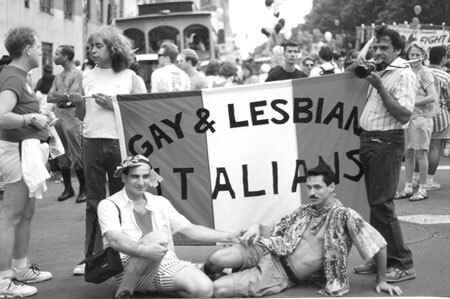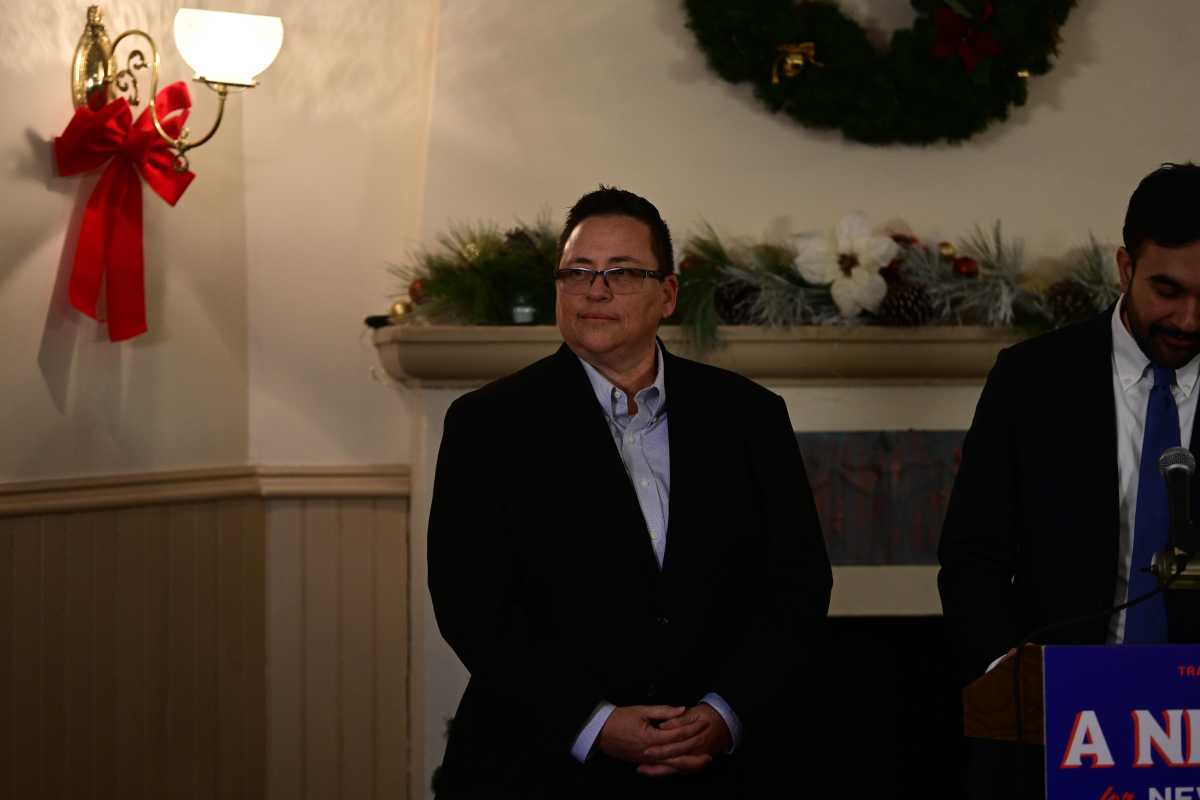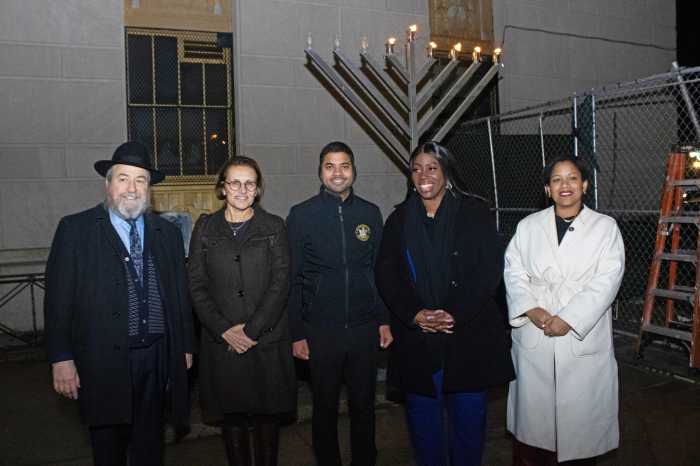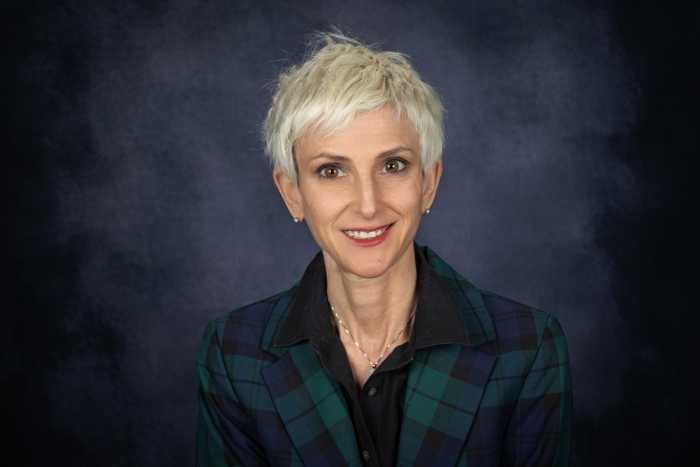Massachusetts high court says marriage the only option
Freedom to Marry Week is Feb. 8-14, but the high court of Massachusetts started the celebration early with its Wednesday clarification for state lawmakers that offering gay couples “civil unions” instead of marriage would not be a constitutionally acceptable compromise.
“The history of our nation has demonstrated that separate is seldom, if ever, equal,” the 4-3 majority of the Supreme Judicial Court wrote, ruling that a Vermont-style civil union law conferring parallel rights but not marriage for same-sex couples “maintains an unconstitutional, inferior, and discriminatory status for same-sex couples.”
Last November’s Goodridge ruling by the court, giving the legislature six months to equalize the marriage laws in the state, had been seen as legally ambiguous by some critics. This ends that debate, but opens another.
Republican Governor Mitt Romney immediately pressed for a vote next week at the state’s constitutional convention for an amendment that would limit marriage to heterosexual couples. If it passes, it must also be approved by the next legislature two years hence before if can go to a voter referendum in November 2006.
The opinion from the court had been sought by the state Senate whose president, Robert Travaglini, did not want to go forward with the amendment vote without the clarification. While an opponent of same-sex marriage, he did not immediately say how the ruling would affect his actions.
The ruling was another great legal victory for Gay and Lesbian Advocates and Defenders (GLAD), but the developments in Massachusetts had already set in motion a nationwide backlash. Ohio became the 38th state to enact a state Defense of Marriage Act (DOMA), which Republican Gov. Robert Taft promises to sign, and twelve states that already ban same-sex marriage are working on writing the ban into their constitutions so that judges cannot overrule the legislatures on the issue. And while they’re at it, some are going after “marriage-like” relationships such as domestic partnerships.
The Federal Marriage Amendment, which President George W. Bush and Vice President Dick Cheney have said they would support “if necessary,” is seen as stalled in Washington even by its right wing supporters. If a court rules that a same-sex marriage performed in Massachusetts must be recognized by a state forbidding such recognition, all bets are off. There is some ambiguity in Bay State marriage law as to whether out-of-state couples can be married there if their nuptials would not be recognized back home.
“At this point,” said GLAD’s Mary Bonauto, “between the Goodridge case and this opinion, the [Supreme Judicial Court] has received and reviewed 45 legal briefs across the spectrum on this question. The SJC clearly believes the word and legal institution are meaningful protections for people and their families because everyone knows that a marriage is the ultimate expression of love and commitment and only marriage bestows the full rights these families deserve.”
Matt Foreman, who heads the National Lesbian and Gay Task Force, said, “In spite of an extraordinary––indeed, unprecedented––campaign of intimidation and threat of culture war from the White House on down, the Massachusetts Supreme Judicial Court held its ground and reaffirmed that discrimination against same sex couples in marriage rights is unconstitutional.”
Foreman hastened to add, however, “We know this ruling will fuel even more anti-gay rhetoric and spur ongoing campaigns to amend both the federal and Massachusetts constitutions to enshrine gay people’s second class citizenship for generations to come.”
Evan Wolfson, director of Freedom to Marry, said, “It’s time to let these couples wed.” He said that despite the right wing’s campaign across the country to “add layers of discrimination, the center is moving toward us. This is their last ditch effort to prevent the tide of history.”
David Buckel of Lambda Legal and Education Fund said, “The court made very clear that the word marriage is so much more than a word.” Relegating gay couples to civil unions, he said, is “not a matter of labels, it’s a matter of taking gay people, putting a fence around them, and therefore you get a different name for your relationships. It’s a message of unworthiness. That’s why the word Marriage with a capital M matters and the court said so emphatically as no other court in the nation ever has.”
Prior to Wednesday’s ruling, the Human Rights Campaign (HRC) had already focused its concern on the Massachusetts constitutional convention vote set for February 11, urging their constituents to join with MassEquality, the local lobbyists on the issue, to defeat the constitutional amendment. The Log Cabin Republicans, led by former Massachusetts state Rep. Patrick Guerriero, has joined the other groups in a media campaign there. The same-sex marriage effort got a boost in Massachusetts last week when the state Democratic Party endorsed the high court decision.
Marty Rouse, campaign coordinator at MassEquality, said the need for donations is great and urged supporters to visit massequality.org.
“Massachusetts can’t face this onslaught alone,” said Cheryl Jacques, who resigned a Senate seat outside of Boston last month to take the helm at HRC. “If the radical right succeeds in writing discrimination into the Massachusetts Constitution, there is no telling where they will stop.”
The other good news this week came from veteran civil rights leader Julian Bond who announced that he was joining with the National Black Justice Coalition in supporting marriage rights for gay couples.
“I see it as a civil rights issue,” he said, though he was speaking personally and not as the chair of the board of the NAACP. Coretta Scott King, Carol Moseley Braun, Al Sharpton, Rep. John Lewis, and Harvard’s Henry Louis Gates are already part of this African American coalition.
The rest of the political map looks bleak this Freedom to Marry Week.
The Ohio’s legislature’s vote to ban same-sex marriages on Tuesday also prohibited state domestic partner benefits. Karen Holbrook, the president of Ohio State University, wrote to the legislators warning how this law will hinder the school’s ability to attract the best faculty from around the country.
In South Dakota, all 70 members of the House signed on as sponsors of a bill that says, “The uniting of persons of the same or opposite sex in a civil union, domestic partnership, or other similar quasi-marital relationship is not valid and does not confer any legal benefit or privilege under state law.” The state already bans recognition of same-sex marriage.
In Utah, the Senate voted 27-1 for a “Marriage Recognition Policy” to bar approval of same-sex marriage or “marriage-like” relationship for gay couples. No one spoke against the bill during the “debate.”
Though hundreds of gay and lesbian lobbyists and their supporters went to Atlanta on Friday to try to stop Georgia from adopting a constitutional amendment against same-sex marriage, the Atlanta Journal-Constitution, which opposes the measure, said it is “guaranteed to pass.”
The Arizona legislature is asking the Congress to adopt the Federal Marriage Amendment and is looking at a state constitutional amendment against same-sex marriage. Missouri is also in the process of passing such an amendment, which would need voter approval in November.
Indiana’s anti-gay marriage amendment is sponsored by 49 Republicans and 5 Democrats in the 100-member House, but Speaker Patrick Bauer (D-South Bend) says, “It’s not an emergency” and does not want to take it up this year. Nevertheless, the Senate there passed it 42-7 on Tuesday and sent it to the House.
A bill has been introduced to ban same-sex marriage in Vermont’s constitution, where civil unions were instituted by the legislature and former Gov. Howard Dean in 2000. To counter that bill, Rep. David Zuckerman a Burlington progressive, has put forth a bill legalizing same-sex marriage. Neither bill is seen as advancing.
Wisconsin, one of the few states not to have a Defense of Mariage Act, is now considering a constitutional amendment on the subject. It would have to pass two consecutive legislatures before going to the voters in the spring of 2005 at the earliest. But Democratic Gov. Jim Doyle vetoed a state DOMA bill last year.
Iowa legislators are taking up three resolutions on same-sex marriage, including one to amend the Iowa constitution to stop it and one urging passage of the Federal Marriage Amendment.
Even in Canada, where same-sex marriages have been performed since summer in Ontario and British Columbia, there is a delay in making the policy nationwide. As in Massachusetts, the government of the new prime minister, Paul Martin, of the same Liberal Party as his predecessor, Jean Chrétien, has asked the high court whether it would accept a civil union proposal under the human rights charter, and an answer is not expected until the fall. Canada’s justice minister insists the government still supports gay marriage rights, but observers say that, for political reasons, the government wants to be ordered by the court to reject a civil union compromise.
In New York, less is planned for this year’s Freedom to Marry Week than last year’s. The biggest observance is coming from a small group called the Civil Marriage Trail, led by Brendan Fay and Jesus Lebron, organizing several same-sex couples to fly up to Toronto on Valentine’s weekend to get married. Among those making the trip are Frank Jump and Vincenzo Aiosa, a Brooklyn couple who have been together since 1990. Jump is a city schoolteacher and veteran gay and AIDS activist, Aiosa a contractor and apartment remodeler.
Last year, the Metropolitan Community Church of New York organized scores of gay and lesbian couples to apply for marriage licenses at the City’s Marriage Bureau. The City Clerk rejected them, but no arrests were made.
Marriage Equality/NY has no plans to observe Freedom to Marry Week, according to co-chair Dave Thompson. The group’s former co-chair, Scott Jeffrey, is working to make it easy for us to write our state representatives in support of the same-sex marriage bills in Albany by going to the Legalize.com website. He plans on launching the project this weekend.
“Every week is Freedom to Marry Week for us,” said Ross Levi, director of public policy and governmental affairs for the Empire State Pride Agenda. The group has no special plans to mark the week as other states and cities are, but he cited the gay family issue agenda items he detailed to this newspaper two weeks ago, including incremental items like winning hospital visitation and the control of partner remains, as well as allowing gay partners to obtain orders of protection.
“New York has the most restrictive definition of who can get such an order in the country,” he said. “It’s easier in Mississippi.”
Levi said that despite the fact that New York is one of the only states not to have passed a state DOMA, “we should not assume that New York is a safe state when it comes to negative action.” Past assurances, he noted, cannot be relied upon after the Massachusetts court decision. There have been DOMA bills pending in Albany for several years.
The Pride Agenda plans town meetings around the state to educate and build support for gay and lesbian relationship recognition, modeled on a program Lambda Legal undertook in New Jersey last year.
After the Massachusetts opinion was announced, out state Senator Tom Duane (D-Manhattan) said, “How much longer can New York ignore that a large number of its families are denied the numerous benefits that come with civil marriage? How can New York turn its back when other legal jurisdictions surrounding New York are recognizing the rights of same-sex couples?” Duane is holding a hearing on civil marriage for same-sex couples in Albany on March 3.
For more information on what’s going on around the country for Freedom to Marry Week, go to DontAmend.com


































